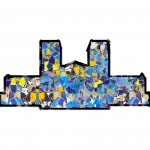When we first step onto this campus, we come not only with suitcases and bundled nerves, but our identities – where we’ve come from and how we see the world – as well.
UCLA, however, sometimes has other ideas. This institution tries to mediate the way we express our identities and tries to homogenize us as “Bruins” first and foremost.
A “Bruin,” in this context, is more than just a campy school mascot. Every time the administration says that “we are all Bruins,” they are in fact saying, “we are all the same.”
This can have a large chilling effect on the way that we conduct business on this campus – it leads, inevitably, to an institution that is merely interested in upholding the status quo and resisting disturbances. In an effort to create a single, cohesive community, individual histories and struggles can often become whitewashed.
This fact can be seen in many of the ways that the university conducts business – from requiring permits to protest on campus to excessively violent tactics used by university police.
As students, it’s our responsibility to mold this university into our vision of how it should be, not the administration’s responsibility. We’re members of the same campus community, this much is true. But our backgrounds are different, our experiences are different, and the ways we view the world are different.
Our campus and the United States are more like – to use another tired metaphor – a mosaic than a melting pot, a unitary whole made up of distinct parts. Diversity makes the two – regardless of size and scale – what they are, no matter how they’re marketed.
This doesn’t mean that we can’t come together. We must recognize and appreciate the differences that make us who we are. Acknowledging difference doesn’t fragment us, but rather it strengthens us by combining the multifarious viewpoints and experiences of individuals to make a diverse, multifaceted whole. Additionally, it conditions us for life after college, where the forces of assimilation and homogeneity can often be amplified.
Student organizations, especially cultural ones for example, are essential for preparing us against these forces, allowing students to form communities within the broader UCLA community.
This isn’t to say that students’ attitudes toward UCLA as an institution should be inherently antagonistic. But the positives that come from being part of this institution stem from the ground up, at the level of student communities, not from the administration down to the students.
It’s these lessons of resistance against assimilation that we should take with us into the always more intense and harsh “real world.”
Students and graduates alike shouldn’t give in to homogeneity. For those of us that will return to campus or join the campus community for the first time next year and for those of us that are graduating and entering the real world, this is of utmost importance. Becoming a part of the melting pot signifies the dilution of our histories.
Many American institutions work this way, and not everything UCLA tries to do to unite us as a community is cynical. Setting aside and ignoring differences to some extent for the sake of uniting as a community can have its benefits.
But this covert erasure, whether intentional or not, should be recognized as the potentially dangerous whitewashing that it is.
After leaving UCLA with degree in hand, we at once escape the homogeneous Bruin identity that often gets pushed onto us and also risk assimilation in the maelstrom that is post-graduation life. This is especially true for communities that have histories of marginalization in the United States.
If there’s anything the Bruin melting pot has taught us, it’s how to resist it and define ourselves as individuals despite its homogeneity. This is one of the most important things we take with us after graduation.
We don’t walk down an aisle between rows of white chairs in early June as Bruins and nothing else.
We’re more than that.
Email Ghoogasian at aghoogasian@media.ucla.edu. Send general comments to opinion@media.ucla.edu.

Baloney…
I can’t figure out why the Daily Bruin prints this GBS (Ghoogasian Bullshlt).
He writes…
‘Every time the administration says that “we are all Bruins,” they are in fact saying, “we are all the same.”’
This is just plain WRONG! When the Administration makes such a comment, they are highlighting something all Bruins have in common – they are pointing a shared commonality. They are certainly not suggesting that “everyone is the same”.
Googasian entire article is based on this faulty premise. Like a house built on a poorly constructed foundation, the ideas Googasian builds on top of this faulty premise are weak and illogical.
He writes…
“In an effort to create a single, cohesive community, individual histories and struggles can often become whitewashed. … Students and graduates alike shouldn’t give in to homogeneity.”
Again, classic GBS (Ghoogasian Bullshlt). When Ghoogasian isn’t accusing white people and jews of discrimination, he’s condemning them for being overly inclusive. There is just no satisfying this bigot.
If you’re tired of Ghoogasian’s constant race-baiting and anti-semitic propaganda (I know I am), than you should write the Daily Bruin Editor and tell him that you’ve had enough of Ghoogasian decisive bigotry.